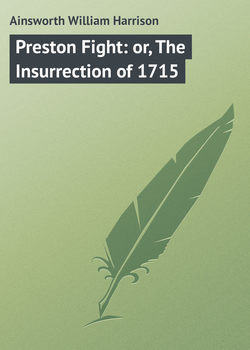Читать книгу Preston Fight: or, The Insurrection of 1715 - Ainsworth William Harrison - Страница 1
ОглавлениеWILLIAM FRANCIS AINSWORTH, ESQ, Ph.D., F.S.A., F.R.G.S., Etc., Etc
The details of Preston Fight, given in the tale, which I have the gratification of inscribing to your name, may be new to you; inasmuch as you may not have seen DOCTOR Hibbert Ware’s very curious historical collections relative to the great Jacobite movement of 1715, published several years ago by the Chetham Society, from which my materials have been derived.
But I am sure you will share my feelings of sympathy with the many gallant Roman Catholic gentlemen, who, from mistaken feelings of loyalty, threw away life and fortune at Preston; and you cannot fail to be struck with admiration at the masterly defence of the town made by Brigadier Mackintosh – the real hero of Preston Fight.
I hope I may have succeeded in giving you some idea of that valorous Highland commander.
Nothing can be better than the description of him given in the old Lancashire ballad:
“Mackintosh is a soldier brave,
And of his friends he took his leave;
Unto Northumberland he drew,
And marched along with a jovial crew.”
What a contrast to the brave brigadier is General Forster, by whose incompetency, or treachery, Preston was lost! – as the same old ballad says:
“‘Thou Forster hast brought us from our own home,
Leaving our estates for others to come;
Thou treacherous dog, thou hast us betrayed,’
My Lord Derwentwater thus fiercely said.”
But the hero of my tale is the ill-fated Earl of Derwentwater – by far the most striking figure in the Northumbrian insurrection.
The portrait I have given of him I believe to be in the main correct, though coloured for the purposes of the story. Young, handsome, chivalrous, wealthy, Lord Derwentwater was loyal and devoted to him whom he believed his rightful and lawful sovereign.
His death was consistent with his life. On the scaffold he declared, “I intended wrong to none, but to serve my king and country, and without self-interest, hoping by the example I gave to induce others to do their duty.”
“My Lord Derwentwater he is dead,
And from his body they took his head;
But Mackintosh and the rest are fled
To fit his hat on another man’s head.”
Lord Derwentwater was strongly attached to his ancestral mansion, and deeply mourned by his tenants and retainers. In the “Farewell to Dilston,” by Surtees, he is made to say:
“Farewell to pleasant Dilston Hall.
My father’s ancient seat;
A stranger now must call thee his,
Which gars my heart to greet.
“Albeit that here in London Tower,
It is my fate to die,
O, carry me to Northumberland,
In my father’s grave to lie.”
How few who visit Greenwich Hospital are aware that that noble institution, of which the country is so justly proud, has derived, for upwards of a century and a half, the immense revenue of six thousand a year from the ill-fated earl’s forfeited estates!
Has not this effaced the treason?
I commend his story to you.
Your affectionate cousin,
W. Harrison Ainsworth.
Little Rockley, Hurstfierpoint,
May 19, 1875.
